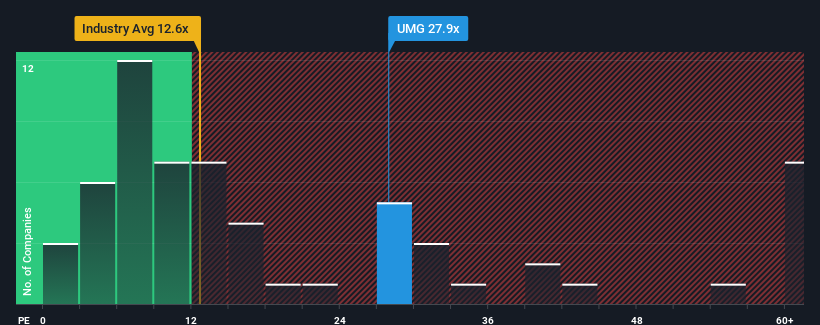- Netherlands
- /
- Entertainment
- /
- ENXTAM:UMG
Risks To Shareholder Returns Are Elevated At These Prices For Universal Music Group N.V. (AMS:UMG)
Universal Music Group N.V.'s (AMS:UMG) price-to-earnings (or "P/E") ratio of 27.9x might make it look like a strong sell right now compared to the market in the Netherlands, where around half of the companies have P/E ratios below 18x and even P/E's below 10x are quite common. Although, it's not wise to just take the P/E at face value as there may be an explanation why it's so lofty.
Recent times have been advantageous for Universal Music Group as its earnings have been rising faster than most other companies. The P/E is probably high because investors think this strong earnings performance will continue. You'd really hope so, otherwise you're paying a pretty hefty price for no particular reason.
Check out our latest analysis for Universal Music Group

Does Growth Match The High P/E?
Universal Music Group's P/E ratio would be typical for a company that's expected to deliver very strong growth, and importantly, perform much better than the market.
Retrospectively, the last year delivered an exceptional 32% gain to the company's bottom line. The strong recent performance means it was also able to grow EPS by 42% in total over the last three years. Therefore, it's fair to say the earnings growth recently has been superb for the company.
Shifting to the future, estimates from the analysts covering the company suggest earnings should grow by 5.3% each year over the next three years. Meanwhile, the rest of the market is forecast to expand by 12% each year, which is noticeably more attractive.
With this information, we find it concerning that Universal Music Group is trading at a P/E higher than the market. It seems most investors are hoping for a turnaround in the company's business prospects, but the analyst cohort is not so confident this will happen. There's a good chance these shareholders are setting themselves up for future disappointment if the P/E falls to levels more in line with the growth outlook.
The Key Takeaway
Using the price-to-earnings ratio alone to determine if you should sell your stock isn't sensible, however it can be a practical guide to the company's future prospects.
We've established that Universal Music Group currently trades on a much higher than expected P/E since its forecast growth is lower than the wider market. Right now we are increasingly uncomfortable with the high P/E as the predicted future earnings aren't likely to support such positive sentiment for long. Unless these conditions improve markedly, it's very challenging to accept these prices as being reasonable.
There are also other vital risk factors to consider before investing and we've discovered 2 warning signs for Universal Music Group that you should be aware of.
If you're unsure about the strength of Universal Music Group's business, why not explore our interactive list of stocks with solid business fundamentals for some other companies you may have missed.
New: AI Stock Screener & Alerts
Our new AI Stock Screener scans the market every day to uncover opportunities.
• Dividend Powerhouses (3%+ Yield)
• Undervalued Small Caps with Insider Buying
• High growth Tech and AI Companies
Or build your own from over 50 metrics.
Have feedback on this article? Concerned about the content? Get in touch with us directly. Alternatively, email editorial-team (at) simplywallst.com.
This article by Simply Wall St is general in nature. We provide commentary based on historical data and analyst forecasts only using an unbiased methodology and our articles are not intended to be financial advice. It does not constitute a recommendation to buy or sell any stock, and does not take account of your objectives, or your financial situation. We aim to bring you long-term focused analysis driven by fundamental data. Note that our analysis may not factor in the latest price-sensitive company announcements or qualitative material. Simply Wall St has no position in any stocks mentioned.
About ENXTAM:UMG
Outstanding track record and good value.
Similar Companies
Market Insights
Community Narratives





